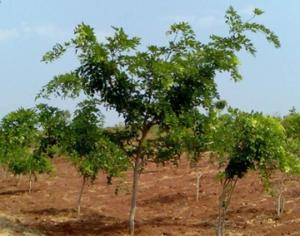EnergyBiofuel tree offers abundant energy
The Pongamia trees require minimal nitrogen fertilizer, grow fast, show a strong tolerance to drought and salinity, plus they will not compete with prime agricultural land; Aussie researchers plan to plant 3,000 hectares of Pongamia trees in north Queensland, which will yield an estimated ten to fifteen million liters of biofuel

The Pongamia tree, believed to be a rich source of biofuel // Source: worldofbioenergy.com
University of Queensland researchers have planted five hectares of Pongamia trees at Hope Vale, north Queensland in a bid to create a commercially viable plantation for sustainable regional development and biofuel production in northern Australia.
In conjunction with Cape York’s traditional land owners and partners, the ARC Center of Excellence for Integrative Legume Research (CILR) is aiming to plant a further 3,000 hectares within the first three years of the partnership, which will ultimately yield an estimated ten to fifteen million liters of biofuel.
A university of Queensland release reports that the seeds from the oil-rich Pongamia pinnata (also called Millettia) tree provide a sustainable solution to the production of biofuel, which in turn, will help alleviate the environmental ramifications caused by automotive, aviation, mining, energy, and marine industries.
Director of the CILR Professor Peter Gresshoff is UQ’s driving force behind the seven year project and believes the initial stages will demonstrate the utility of local biofuel production.
“It’s a native species that has already grown in the area for thousands of years,” he said. “More and more communities will be able to adopt our research and potentially support nations outside of Australia.”
If this is not enough of a reason, the tree requires minimal nitrogen fertilizer, grows fast, shows a strong tolerance to drought and salinity, plus it will not compete with prime agricultural land.
The seeds are also inedible, which makes the crop worry free when it comes to the controversial food-for-fuel debate.
John McIntyre of Balkanu Cape York Development Corporation says that project partners are also committed to indigenous employment as well as ensuring community and commercial success.“Approximately 80 new jobs will be created in the first five years,” he said.
The release notes that over the next decade bio-based products will increasingly play a pivotal role in the global shift from fossil fuel dependent economies to a greener and cleaner future.
Despite this promise, extensive research is needed for optimal genetic material suited to specific regions, innovative management and harvesting procedures and down-stream conversion and utilization.
Australia’s current diesel requirement is about 20 billion liters a year.
Professor Gresshoff said pongamia-derived biodiesel was thought to initially meet 20 percent of the demand with only 7,000 square kilometers of plantations.
It was an unlimited possibility considering the country has close to one million square kilometers where Pongamia trees could flourish.
